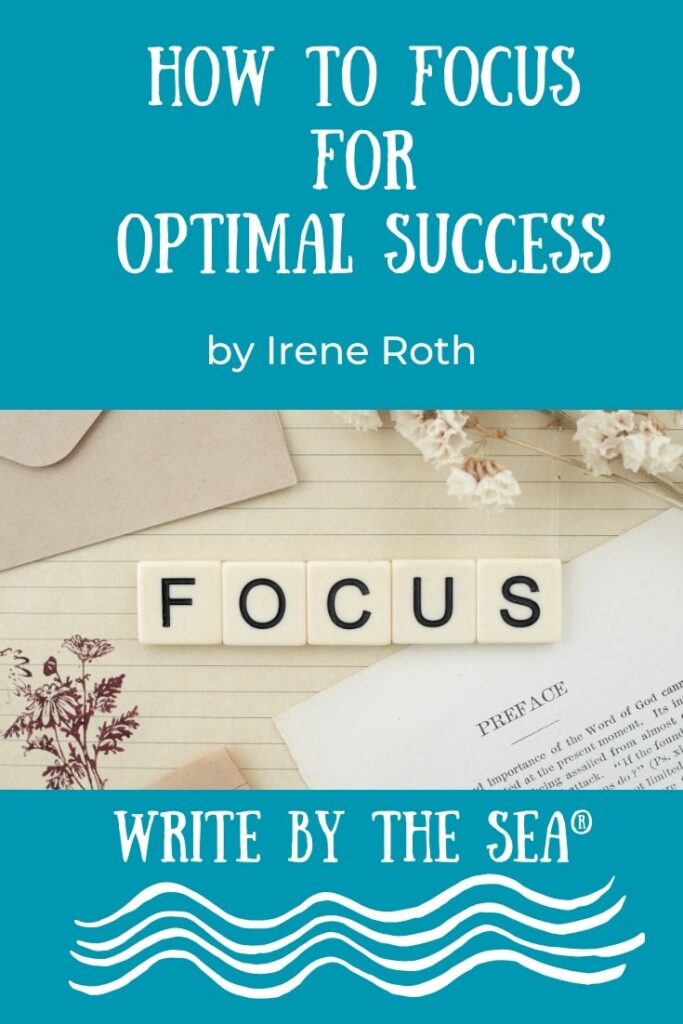How to Focus for Optimal Success by Irene Roth

In the chaotic landscape of modern life, writers often navigate a minefield of distractions.
From social media notifications to household chores, the demands on our attention are relentless.
Yet, amidst this turmoil, cultivating inner focus is not just a luxury for writers; it’s a necessity.
It’s crucially important to be productive, successful, and to be feel proud of your writing.
But it can be hard to do.
It’s not just outside distractors but internal ones that plague writers.
In fact, the internal distractors may be the hardest to overcome.
This is because when we sit down to write, our mind is all over the place.
We may still be thinking about that argument we had with our spouse or boss.
Perhaps we ran into our friend and she’s struggling with an illness.
Or we may have just recently discovered that a family member has cancer.
Any one of these experiences can cause a lot of gaps in our thinking and can negatively affect our ability to focus.
Just as a painter prepares their canvas, and a musician tunes their instrument, writers must also get ready internally to navigate the vast landscape of their imagination.
Here are some tips to help us on those hard days.
Cultivate Mindfulness
At the heart of inner focus lies mindfulness, the practice of being fully present in the moment.
Before diving into the act of writing, take a few moments to ground yourself.
Close your eyes, breathe deeply, and center your awareness on the sensations of your breath.
Before putting pen to paper or fingers to keyboard, take a moment to clarify your intentions for the writing session.
Ask yourself: What do I hope to accomplish? What message do I seek to convey?
By aligning your intentions with your writing goals, you provide a clear roadmap for your creative endeavors, fostering a sense of purpose and direction.
Create a Sacred Space
Designate a physical space for writing that is conducive to focus and inspiration.
Whether it’s a cozy nook in your home, a bustling coffee shop, or a tranquil outdoor setting, choose an environment that resonates with your creative energy.
You may also want to surround yourself with objects that inspire you, such as books, artwork, and plants.
Make this space a sanctuary for your writing practice.
Set Boundaries
Set firm boundaries around your writing time to safeguard against interruptions.
Silence your phone, disconnect from social media, and communicate your needs to those around you.
This can empower you to focus wholeheartedly on the task at hand.
Engage in Rituals
Rituals can serve as powerful anchors to signal the transition into writing mode.
Whether it’s brewing a cup of tea, lighting a candle, or reciting a favorite mantra, incorporate rituals into your pre-writing routine to signal to your subconscious that it’s time to focus.
Over time, these rituals become ingrained in your psyche, serving as potent catalysts for creativity.
Practice Self-Compassion
Writing is a journey fraught with peaks and valleys, successes and setbacks.
Practice self-compassion as you navigate the inevitable challenges that arise along the way.
Be gentle with yourself in moments of self-doubt or frustration, and remember that imperfection is an inherent part of the creative process.
Cultivate Gratitude
Cultivate an attitude of gratitude as you embark on your writing journey.
Take a moment to reflect on the abundance of blessings in your life, such as the support of loved ones, the beauty of the natural world, and the gift of creativity itself.
Therefore, when you get to your desk to write, it’s important to prepare yourself mentally to write.
You might assume that once you sit in your chair, you’ll focus right away and write.
But your mind and other distractors can get in the way.
Why not refine how you start your writing sessions so they are more productive, meaningful and enjoyable?
There’s nothing more frustrating than being distracted by things that are secondary to your writing goals.
This is especially the case if you don’t have a lot of time to write because you have other responsibilities.
Your mindset matters.
If you’re scattered, you won’t get a lot of writing done.
If you’re focused, you will be at your best and you will want to return to write again tomorrow because you feel in control, resilient, and content.
About Irene Roth
 Irene Roth has a master’s degree in Philosophy and Psychology from York University, Ontario, and is currently using her expertise to write books for adults about how to be a productive writer. She has published over 150 books and e-books for adults on different topics such as the writing life and different aspects of chronic illness. She has been running workshops at Savvy Authors on many topics for writers for over ten years. She also leads a very successful mentoring group for writers on Savvy Authors that is in its sixth year. She coaches writers on how to be their best.
Irene Roth has a master’s degree in Philosophy and Psychology from York University, Ontario, and is currently using her expertise to write books for adults about how to be a productive writer. She has published over 150 books and e-books for adults on different topics such as the writing life and different aspects of chronic illness. She has been running workshops at Savvy Authors on many topics for writers for over ten years. She also leads a very successful mentoring group for writers on Savvy Authors that is in its sixth year. She coaches writers on how to be their best.
She lives in Ontario with her husband Jim, cat Toby, and dog Milo. Her website is: https://irenesroth.com/.





